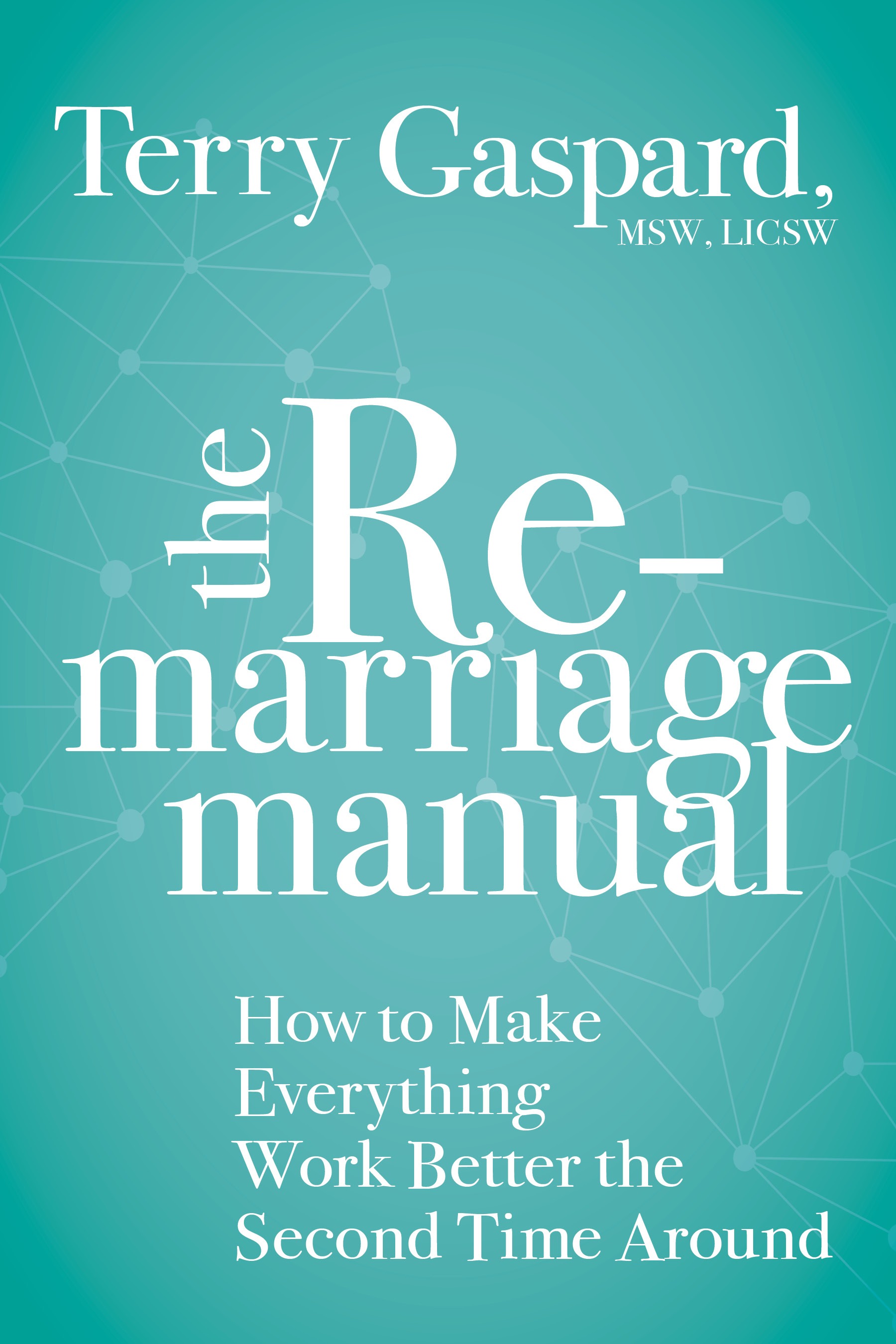
Having counseled couples for more than 30 years and conducted original research, Terry Gaspard knows the pitfalls and the landmines. Unfinished business with exes (and other old baggage), pressures of dealing with debt and handling money, blending families, finding time and space for sex, managing conflict, and more can strain second marriages to the breaking point.
The Remarriage Manual is a culmination of Gaspard’s work—providing insights, stories, and tools that she’s used to direct countless remarried couples toward lasting happiness (including her own). The post below is an excerpt from The Remarriage Manual: How to Make Everything Work Better the Second Time Around.
According to experts, the most common reason couples fall out of love and stop being sexually intimate is because of a pursuer-distancer dynamic that develops over time. Sue Johnson identifies this pattern as the “protest polka,” and says it is one of three “demon dialogues.” She explains that when one partner becomes critical and aggressive, the other often becomes defensive and distant. John Gottman’s research on thousands of couples reveals that partners who get stuck in this pattern in the first few years of marriage have more than an 80 percent chance of divorcing in the first four or five years.
Why is this relationship pattern so common? Gottman found that men tend to withdraw and women tend to pursue when they are in intimate relationships. Further, he explains that these tendencies are wired into our physiology and reflect a basic gender difference. In his classic “Love Lab” observations, he notes that this dynamic is extremely common and is a major contributor to marital break-down. He also warns us that if it’s not changed, the pursuer-distancer dynamic will persist into a second marriage or subsequent intimate relationships.
Partners in intimate relationships tend to blame the other person when their needs are not being met. A pursuer-distancer dance follows, which intensifies the dynamic. Couples report having the same fights repeatedly. After a while, they’re no longer addressing the issue at hand and a vicious cycle of resentment, frustration, and anger develops and never gets resolved.
While all couples need autonomy and closeness, many partners struggle with the pursuer-distancer dance and feel chronically dissatisfied with their degree of intimacy. When the pattern of pursuing and distancing becomes ingrained, the behavior of one partner provokes and maintains the behavior of the other. It’s normal to feel a sense of disappointment when your desire for emotional and sexual intimacy doesn’t match your partner’s, and a pursuer-distancer dynamic can develop in the bedroom. While this dynamic is one of the most common causes of divorce, don’t panic! Lacking sexual intimacy is a common struggle for hard-working couples balancing jobs, parenting, and intimacy.
In Wanting Sex Again: How to Rediscover Your Desire and Heal a Sexless Marriage, sex therapist Laurie J. Watson writes, “Most sexual concerns stem from an interpersonal struggle in the marriage.” She describes the tug-of-war between being too close and too distant from a partner as a repetitive pattern of one person being the pursuer and another being the distancer.
In many cases, the distancer retreats and seeks out alone time when under stress, and this intensifies their partner’s need for closeness, thus their desire to pursue. The problem is that if this pattern becomes deeply entrenched, neither person gets their needs met. Sometimes a distancer realizes too late that their partner is severely distressed and they have already started making plans to end their relationship.
HOW TO DEAL WITH A DISTANCER OR PURSUER
Let’s examine how the pursuer-distancer dynamic usually works by looking at a typical scenario with Suzanne and Keith, whom you met earlier. Suzanne’s demands for more sexual intimacy are her way of motivating Keith to open up, so she can gain reassurance from him. In this case, the ways that Suzanne and Keith respond to each other backfire, creating a negative pattern of interpersonal relating.
“Let’s talk about why we’re not spending time together anymore,” Suzanne complains, as her husband reads the newspaper and turns away from her bids for connection. She says, “How can we get along if we don’t work on our problems?”
Keith responds, “I’m not sure what problems you’re talking about. We’re getting along okay. All couples go through hard times.”
Suzanne feels increasingly frustrated with her attempts to draw out Keith. Meanwhile, Keith resorts to his typical distancer strategy, perhaps stonewalling her attempts to communicate by giving her the silent treatment. As she continues to express more disappointment in Keith, he further withdraws. If this pattern isn’t reversed, it’s easy to see how they can both begin to feel criticized and develop contempt for each other — two of the major warning signs that their marriage is doomed to fail, according to John Gottman.
It’s no wonder that many of the interactions between couples become deadlocked in the pursuer-distancer dynamic. Partners can end up in a stalemate and are left feeling bitter and disillusioned about their marriage. Repair work begins with expressing your intent in a positive way and taking responsibility for your part in this negative cycle. This can be done by saying things such as “I’d really appreciate it if you’d cook dinner tonight since I’m behind on projects at work and need to work late.”
Without recognizing it, many pursuers come on stronger than they intend to, not realizing that being in the “pursuit mode” may cause their distant partner to withdraw even more. Likewise, by pulling back, a distancer may cause their pursuer partner to pursue more vehemently. Watson suggests that couples entrenched in this pattern try switching roles to find out firsthand what it’s like to walk in their partner’s shoes. This can be a way to enhance empathy, awareness, and possibly even jump-start a new behavioral pattern of initiating and responding to sexual advances from your partner. In general, most couples can balance their needs for closeness and separateness in terms of sexual intimacy if they develop more vulnerability, compassion, and sensitivity to their partner’s needs, both inside and outside of the bedroom. A good first step is to establish more emotionally intelligent dialogue that allows both people to feel heard and validated.
Dialogue to Grow Closer Together
Here is a possible dialogue for remarried couples who want to learn about each other and grow together emotionally and sexually.
Partner A: I feel left out when you don’t open up to me. I’d like to know what you’re thinking when I share my feelings with you.
Partner B: It sounds like you’d like me to share more of my thoughts with you when you’re talking about your feelings. I can work on that.
Partner A: I feel hurt when you read the paper when we’re eating dinner because I’d like to learn more about your day and get close to you.
Partner B: You’d like me to be more engaged with you during dinner. I wasn’t aware that your feelings were hurt. I do get tired in the evening after working all day, but I’ll try to interact more because it’s important to you.
Partner A: When we have loving sex, I feel closer to you. I’d like to talk about ways we can please each other sexually and both get our needs met.
Partner B: I feel closer to you too, even though it’s hard for me to open up and talk about sex. Let’s try to find ways we can both get our needs met sexually and be more intimate.
Practiced daily, this type of dialogue will create a stronger emotional and sexual connection between you and your mate. Couples who spend at least thirty minutes daily in conversation with each other and express love, affection, and admiration will foster a closer bond and thrive both in and out of the sheets.
Excerpted from THE REMARRIAGE MANUAL by Terry Gaspard, MSW, LICSW. © 2020 Terry Gaspard. Reprinted with permission of Sounds True. All rights reserved.

Sign Up and Elevate Your Relationship in Just 60 Seconds
The Marriage Minute is an email newsletter from The Gottman Institute that can improve your relationship with a digestible, bi-weekly dose of helpful tips and tricks. Over 50 years of research with thousands of couples has proven a simple fact: small things often can create big changes over time.








